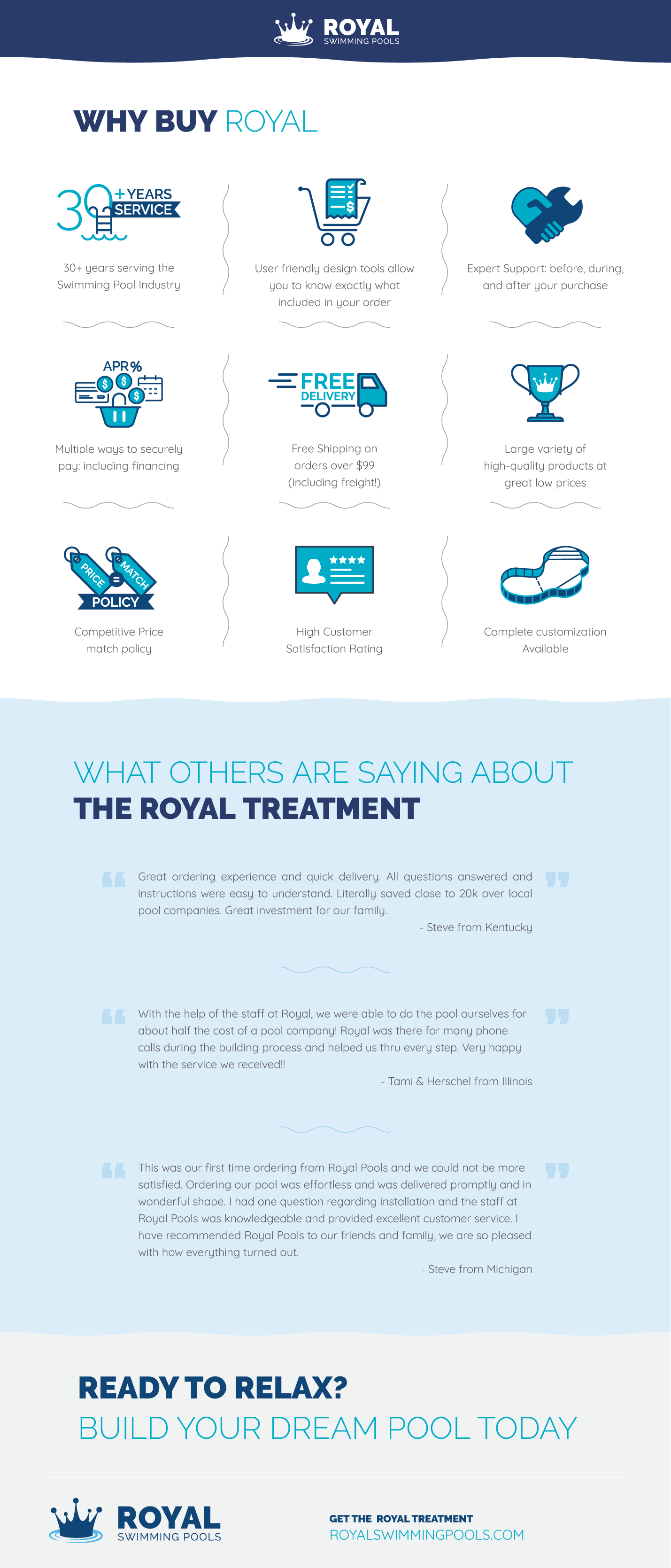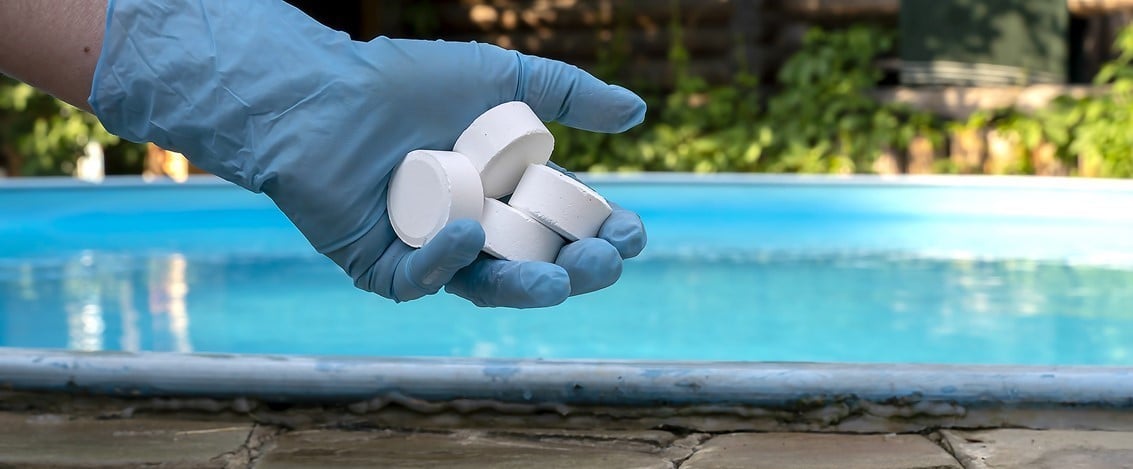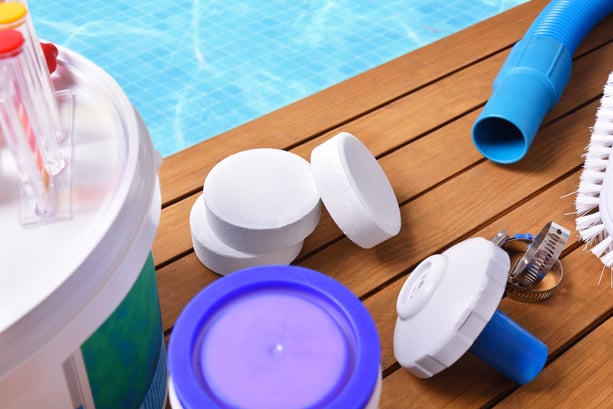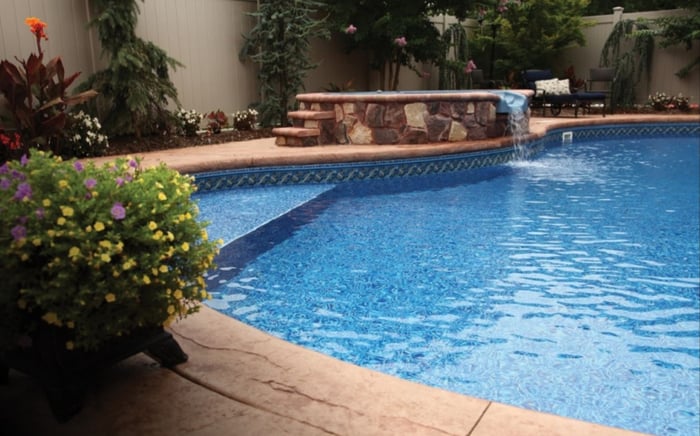When it comes to pool sanitation systems, there are quite a few options available. The most popular are traditional chlorine and saltwater systems, and mineral systems.
But what are the differences between chlorine, saltwater and mineral swimming pools? Does one keep the water cleaner than another? What's better for your pool? What's better for your skin and hair? Which is the most cost-effective?
If there were just one perfect pool sanitizing system, there wouldn't be so many to choose from. But, like most aspects in building a pool, saltwater, chlorine and mineral systems all have their own sets of pros and cons - and which you choose will ultimately be up to what you value as most important.

TRADITIONAL CHLORINE SANITIZING SYSTEMS
These have long been the standard in pool sanitation. Why? Because it is the easiest way to kill bacteria. For this reason, most of the sanitation systems used with pools, use chlorine in some shape or form. A lot of household cleaning products have chlorine in them, and even the tap water you drink is chlorinated. Chlorine kills bacteria, it's as simple as that.
However, it's important to know that in August 2020 the nation's largest supplier of the main component found in chlorine burned down. Paired with the nation's already rising supply issues, chlorine (especially tablets) skyrocketing in price. This led many pool owners to look for chlorine alternatives. Many turned to salt. Due to the corrosive nature of salt systems, many more turned to mineral systems. And those who wanted to eliminate chlorine altogether paired the Pool Frog Mineral System with EZ Pool sanitizer and said goodbye to chlorine tablets altogether.
Chlorine keeps a pool clean through a series of chemical reactions. Chlorine breaks down the cells in harmful bacteria and renders them harmless. Think of bleach, after all, bleach is most commonly chlorine and/or hydrogen peroxide. Technically, you can sanitize a pool with bleach, but that is much more expensive than buying the raw chemicals such as granular, or chlorine tablets. This is typically the cheapest upfront cost, but season by season can add up to one of the most expensive ways to sanitize your pool. Especially if you let your chlorine levels drop, and let the pool turn green. Some prefer to spread the cost of maintaining a pool out over time, and it works for many budgets this way.
A traditional chlorine system typically works by adding chlorine to the pool as needed; typically on a weekly basis. This can be done through one of the following:
- Chlorine Tablets
- Granular Chlorine
- Liquid Chlorine
Chlorine Tablets are slow to dissolve tablets, providing a more stable chlorine level that doesn't peak and valley so much over time. When you add tablets, your chlorine level is usually the same as it was when you added tablets last time, not at the bottom of the testing scale. Tablets are often added to the pool through a chlorine dispenser unit referred to as a chlorinator. These are very inexpensive to purchase, install, and service by the average DIY homeowner. When you keep your chlorinator with tablets in it, run the filter system on a schedule, and set the dial on the chlorinator to the needed level, you end up with a constant level of chlorine in your pool. Leaving only the need to shock occasionally, such as after a pool party, or if your free chlorine test shows lower than your combined chlorine.
Combined chlorine = your total chlorine – your free chlorine, or (CC=TC-FC).
Chlorine tablets do have a lower ph than you keep your pool at, so you do have to adjust it a little more often than just granular chlorine, but not that bad. A Chlorinator is available in two forms:
- An automatic system that can be added to or tied directly into your pool's plumbing and filtration system that is adjustable
- A simpler floating chlorine dispenser
We offer a wide range of chlorinators to help maintain your pool's sparkle! See some of our top sellers below:
- Hayward CL200 Automatic Inline Chlorinator
- Pentair Rainbow Model 300 Automatic Off-Line Chlorinator
- Hayward CL220 Large Capacity (9lbs) Automatic Chlorinator
Granular Chlorine is a little harder to use compared to others. To use, granular chlorine will need to be put in a bucket of water, dissolved, and then poured around the perimeter of the pool; preferably over the return jets. This causes chlorine levels to spike, be high for a while, drift down, and then you shock it again when it gets low. When using granular chlorine alone, it is a lot easier for the pool to turn green, or develop bacteria build-up (cloudy pool water) because it depends on you adding chlorine when the level gets low, not necessarily at the same time every week. The levels don't always drop at the same rate, a few extra swimmers, a rain, or just a few extra hot days can use up the normal amount you add faster. Most commonly, granular chlorine is used with tablets, so that smaller amounts of granular is added, and a little less often. Usually, just to “shock” the pool, and kill bacteria that have started to build an immunity to the constant level of chlorine that tablets can provide.
Liquid Chlorine is so popular because it can be poured directly into the pool, with no mixing. Liquid chlorine is pre-mixed but is harder to store since it is pre-dissolved. It just takes up a large amount of space. You can buy 8-16 weeks or more worth of tablets and granular chlorine in 2 buckets, where those same 2 size buckets hold a week or twos worth of liquid chlorine. One gallon of liquid is comparable to about a pound or so of granular chlorine depending on brand and strength. So 25 lbs of powder, compared to 25 gallons of liquid, is a big difference. This usually results in keeping a huge storage barrel, or multiple trips to the pool store. It also has a really high PH and is very corrosive. It will require a lot of acids to be kept and added regularly.
The Benefits of a Traditional Chlorine System
The biggest benefit of a traditional chlorine system used to be that not only is the system a low-cost investment but the chlorine itself is relatively inexpensive and very easy to add to a pool. Now, with the recent price increases the cost of the actual chlorine is fairly expensive however the systems and ease of use are still considered a benefit. Just keep an eye on your levels, add chlorine as necessary, and your pool should remain crystal clear.
Traditional chlorine systems need extremely little equipment maintenance. However, since these systems are so widely used, they'll also be the easiest type to find people to work on or repair should any issues arise.

The Drawbacks of a Traditional Chlorine System
Remember that classic "swimming pool smell" that brings back childhood memories around a pool. That's pretty much all due to chloramine - the byproduct of the interaction between chlorine and bacteria in a pool. And while the smell alone may be reason enough for some people to prefer alternative sanitation systems, the added irritation on eyes and skin and harshness on hair and clothing can take traditional chlorine out of the running for some swimmers.
In addition, the smell and potential irritations, chlorine systems have one other major drawback: they don't self-regulate very well. What this means is that although a chlorine system pool is generally the least expensive option for a pool sanitation system, it also requires the most amount of maintenance labor. Chlorine loses much of its effectiveness if your pH levels get too far off, which means you'll have to spend more time adding additional chemicals if you want your chlorine to work. And without the help of a chlorine stabilizer, such as cyanuric acid, your chlorine levels will deplete fairly quickly in sunlight.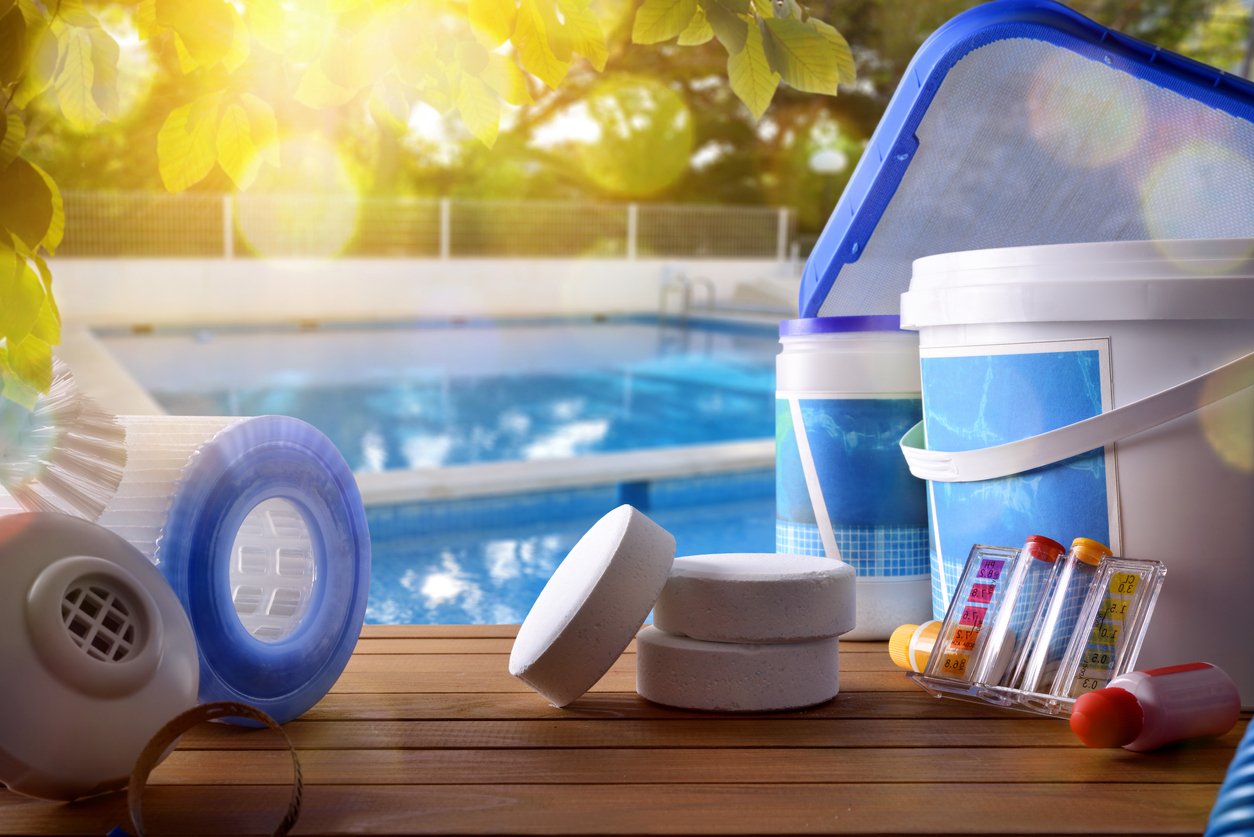
Also, keep in mind that chlorine is a dangerous chemical. It's generally fine when diluted into a pool, but when in its pure chemical or tablet form, it can cause potential hazards if not stored and handled responsibly.
SUMMARY
Traditional chlorine used to be the most cost-effective solution for swimming pool sanitation, however, that's just not always the case these days. And with most pool owners looking for something that will require less work and irritation, many are considering one of the other options: Salt or Mineral
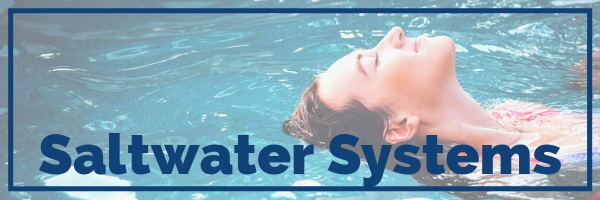
SALTWATER POOL SYSTEMS
The first thing to get out of the way is this: No, saltwater pools do not taste salty like the ocean. :) You also won't float in them like you would in The Dead Sea. In fact, a saltwater pool really doesn't have a very high concentration of salt in the water at all!
The second thing to know is that a saltwater pool is NOT completely free of chlorine. In fact, saltwater pools use the same basic chemicals to break down organic matter as a traditional chlorine system. The difference is that instead of adding chlorine directly to the pool, you add salt -NOT table salt- which in turn interacts with a salt cell that acts as a chlorine generator. In short, you are making your own Chlorine versus buying it in a retail store and adding it yourself. Yes, we know... mind. blown.
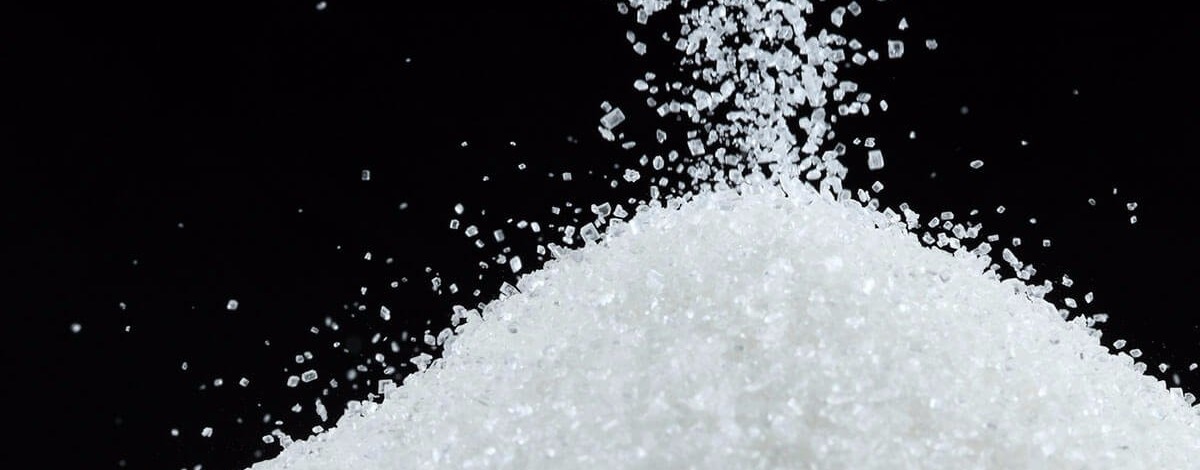
The Benefits of a Saltwater System
Many of the negatives from chlorine pools are not issues when it comes to saltwater. This includes reduced irritation of eyes and skin and water that is gentler on hair and clothing. Water in a saltwater system also tends to feel "softer".
You still check the chemicals regularly in a salt pool, but you will typically make less frequent adjustments since you'll see fewer peaks and valleys with sanitation levels. Plus salt is low in cost and recycles itself!
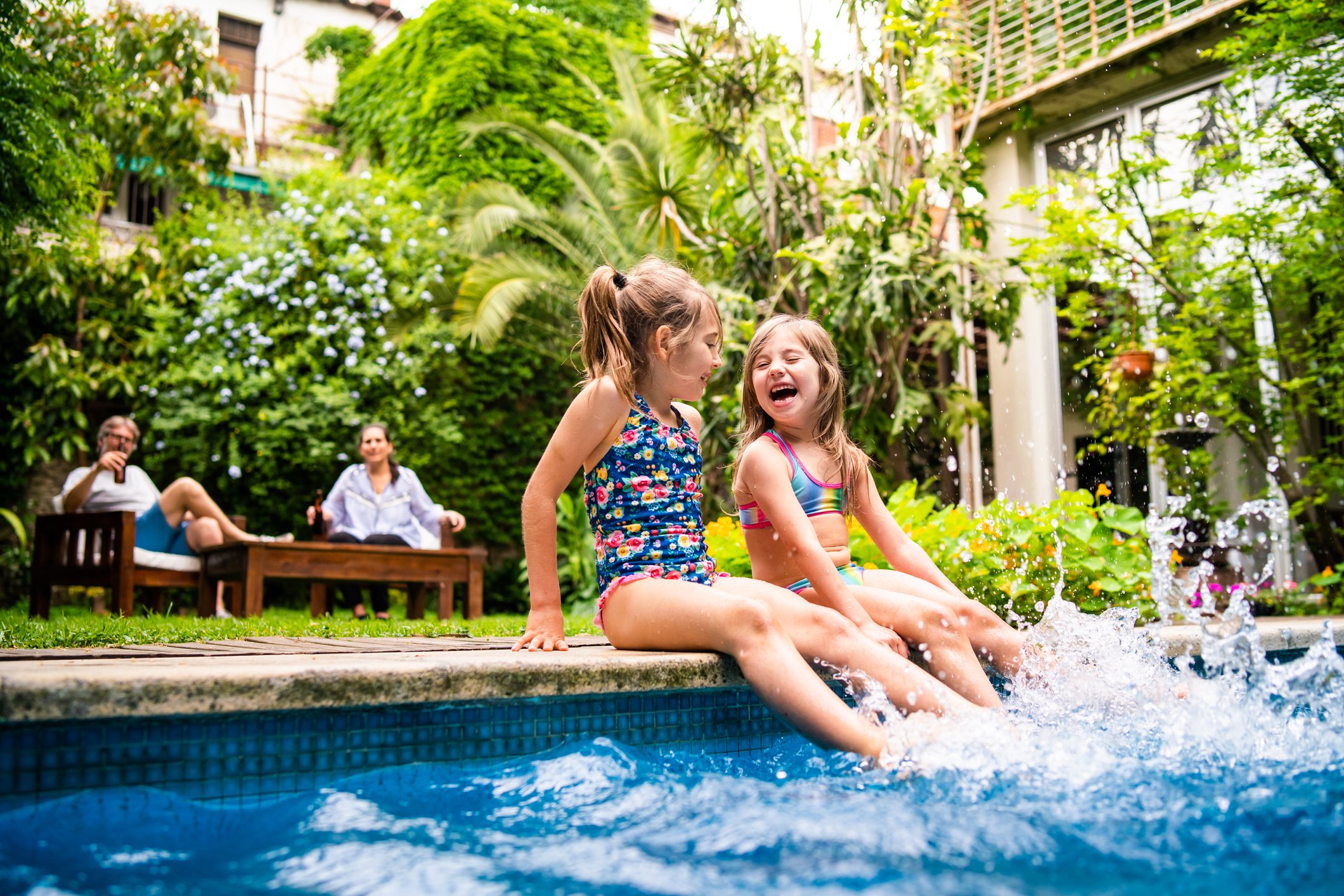
The Drawbacks of a Saltwater System
While your skin and hair will thrive and will thank you for choosing a saltwater-based pool, your pool components may not. Saltwater is very corrosive and will {eventually} eat away at the valuable metal components in and around your pool such as ladders, handrails, patio furniture, and internal parts of your equipment such as motor and heater parts. However, there is a device that slows down this process.
A Sacrificial Anode is a Zinc device that protects these metal components from corrosion. Zinc is a metal that gives up its ions faster than any other metal in the pool so the Zinc Anode will be the first to go. Sacrificing itself over all other metals, giving this brave little item it's namesake: Sacrificial Anode. The Anode lasts approximately 3 years but needs to be replaced when halfway eroded. It is highly recommended for any saltwater pool.
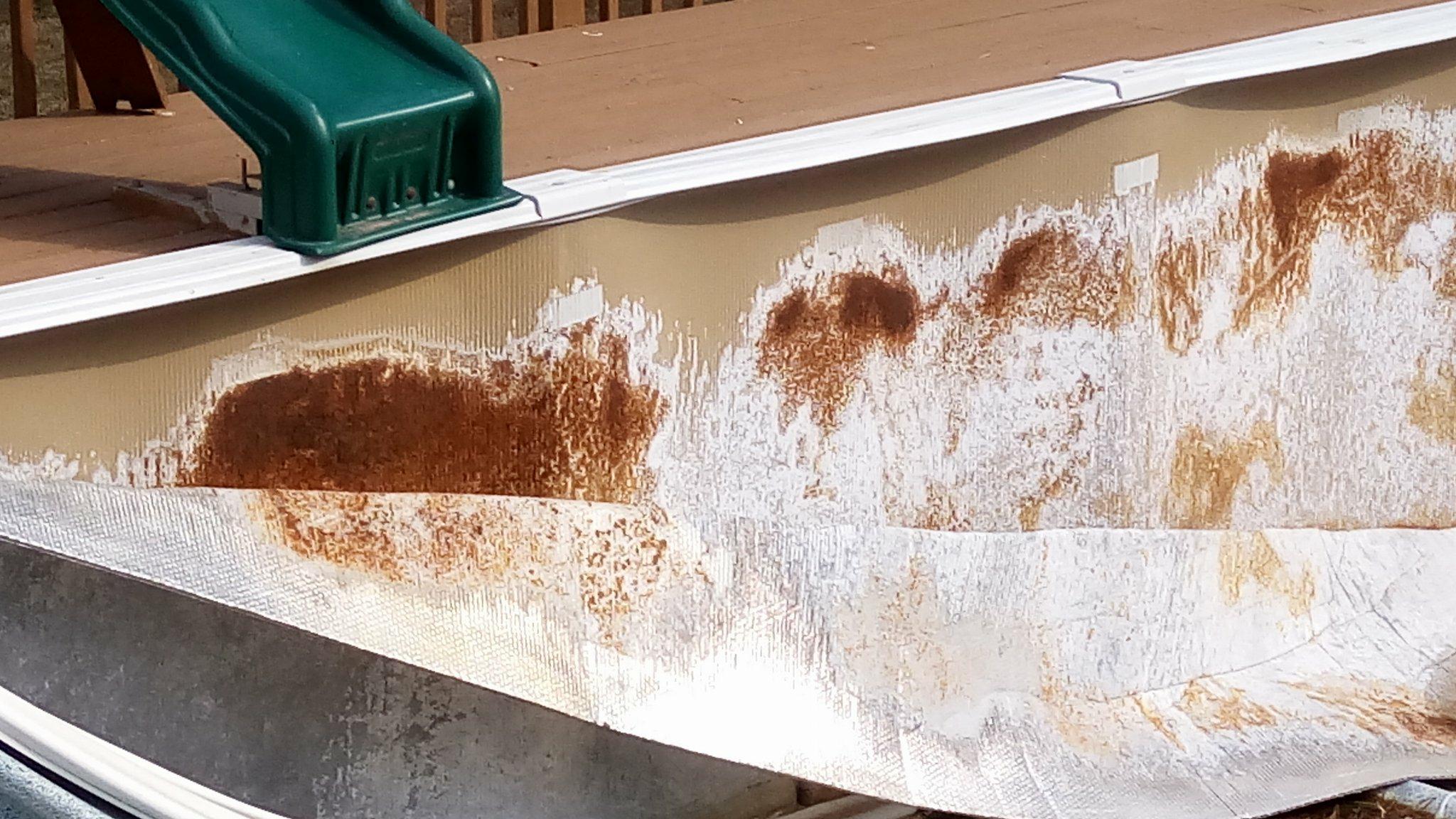
TIP: A Sacrificial Anode will need to be connected to pool bonding wire and grounding. All bonding and grounding should be done by a licensed electrician, and all local and NEC codes followed.
Sacrificial Anodes will help to protect metal components of the pool connected and bonded together, but not movable items such as metal patio furniture. Storing those further away from the pool, and rinsing frequently will help. Learn more about these handy doo-dads here!
GOOD TO KNOW: Most salt cells will not operate at temperatures below 50 degrees and require packaged Chlorine anyway if your pool is to remain open during the winter. (not a huge deal, because algae won't grow as easily in cold water)
SUMMARY
While a salt system can be an investment upfront, they usually pay for themselves after a few years in both maintenance time and money.
We have several options for salt systems at Royal Swimming Pools. Learn more about these products below:
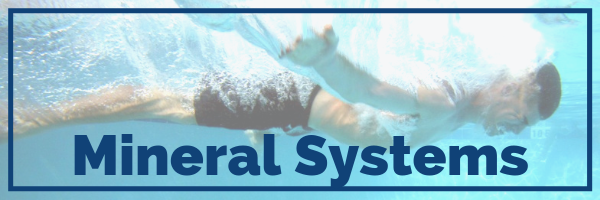
MINERAL POOL SYSTEMS
A low chlorine alternative in pool sanitation that has been around a long time, and proven itself is mineral systems. Mineral pools add additional minerals to your water, usually including magnesium chloride, sodium chloride, and potassium chloride. These minerals work together to keep your pool clean and help battle algae and bacteria, among others. Using the mineral systems reduces your need for chlorine by about 50%. (However, when paired with the E-Z Pool Sanitation System, you can completely eliminate having to add any chlorine to your pool at all.)
You'll have the low initial investment of the system itself, then a once-a-season revolving expense of replacing the mineral pack inside the system. These costs offset themselves in smaller pools, but in larger pools can make this a cheaper year-to-year alternative. The mineral packs cost around $100, so if you're using more than $200 a season in chlorine, it could be a cheaper alternative, not to mention, mineral water is much less irritating to eyes, skin, and bathing suits.
The Benefits of a Mineral System
One of the biggest benefits for those who choose to install or upgrade to a Mineral System is the overall quality of the water. People who swim in mineral system pools often say the water feels "silky and soft" - and this is due to the way the minerals interact with the water. and that's just using the mineral system and reducing the chlorine need by 50%. The water quality reaches it's peak when you pair a Mineral System, such as Pool Frog, with E-Z Pool sanitation for 100% chlorine tablet-free mineral water. Minerals (Frog) and Active Oxygen (EZPool) work together to significantly lower the need for chlorine, resulting in no need for traditional tablets.
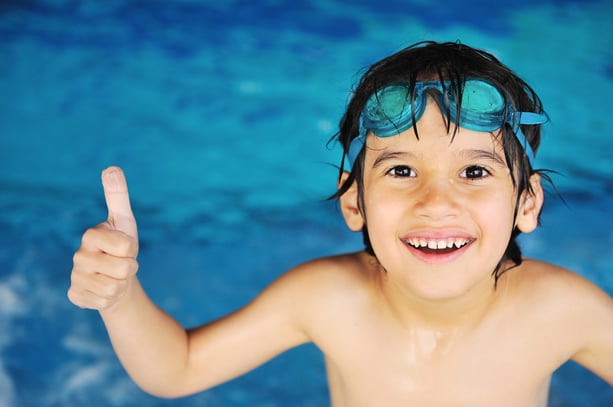
Even without adding products like E-Z Pool, since chlorine levels are so low in a mineral system, you'll also avoid issues common in traditional chlorine systems such as dry skin, itchy eyes, and damaged hair.
Lastly, your pool system and components will benefit from mineral systems due to the reduction in harsh chemicals that can cause wear and tear. This also means that, unlike saltwater systems, you won't have to worry about the corrosive nature of salt on your metal, clothing, and concrete.
You can learn more about the different minerals and their benefits in our another article here!
The Drawbacks of a Mineral System
The biggest complaint of those who own a mineral system are having to use chlorine with them. It is not uncommon for people to say they are using the same amount of chlorine as they did without. This should not be happening. A normal chlorinated pool has a range of free chlorine between 1.0 & 3.0 PPM. Most keep between 2-3 PPM because 1.0 and lower usually isn't far from an algae bloom. A mineral pool should have no more than .5 PPM.
However as mentioned, the recent discovery of being able to use E-Z Pool products in combination with a mineral system completely eliminates the biggest mineral system complaint out there.
Switching from a standard chlorine pool to a mineral pool, some don't realize the level of chlorine in the pool is supposed to be kept a lot lower than normal, therefore, they do not reap the benefits as much as those who keep the chlorine level where it is supposed to be.
SUMMARY
Mineral pools are growing in popularity and for good reason. They have proven themselves for many years, long before salt systems were popular. They're the easiest to maintain and the gentlest on both our pools as well as our bodies. For those who are looking for the best value in pool sanitation systems, mineral systems should be high on your list of considerations.
If you would like to know more, make sure to check out the products below:
- Low Mineral Chlorine Sanitzers
- POOL FROG Sanitation Systems
- Nature2 Sanitation Systems
- New Water Sanitation Systems
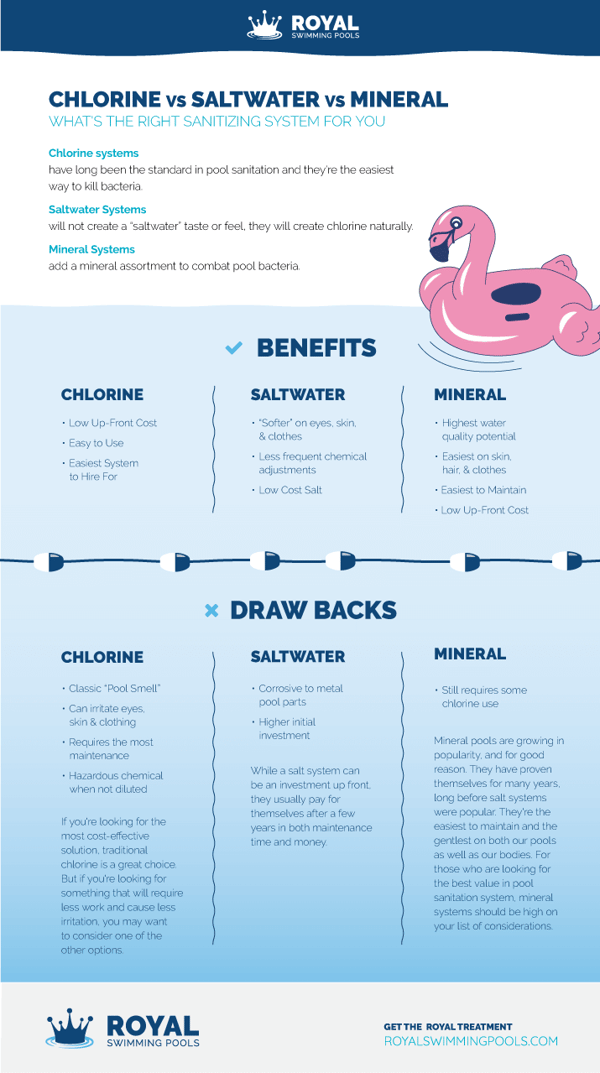
There are so many choices to make when it comes to designing your perfect backyard gathering place. While safety and cleanliness should always be your top priorities we know they aren't the exciting portions of your planning phase. If you need any other suggestions, tips, or insight on this topic- let us know! We'd be more than happy to sort through your ideas and help determine what system is best for you and your family!
Thanks for choosing Royal Swimming Pools for all of your swimming needs!
As always, swim happy!
Additional resources for your pool buying journey:
- How much does it cost to install an inground pool
- What to know when buying an inground pool
- Build Your Own Pool & Save
- Vinyl VS. Fiberglass VS. Concrete: Pros, Cons, and More!
- Inground Pool Buying Guide
